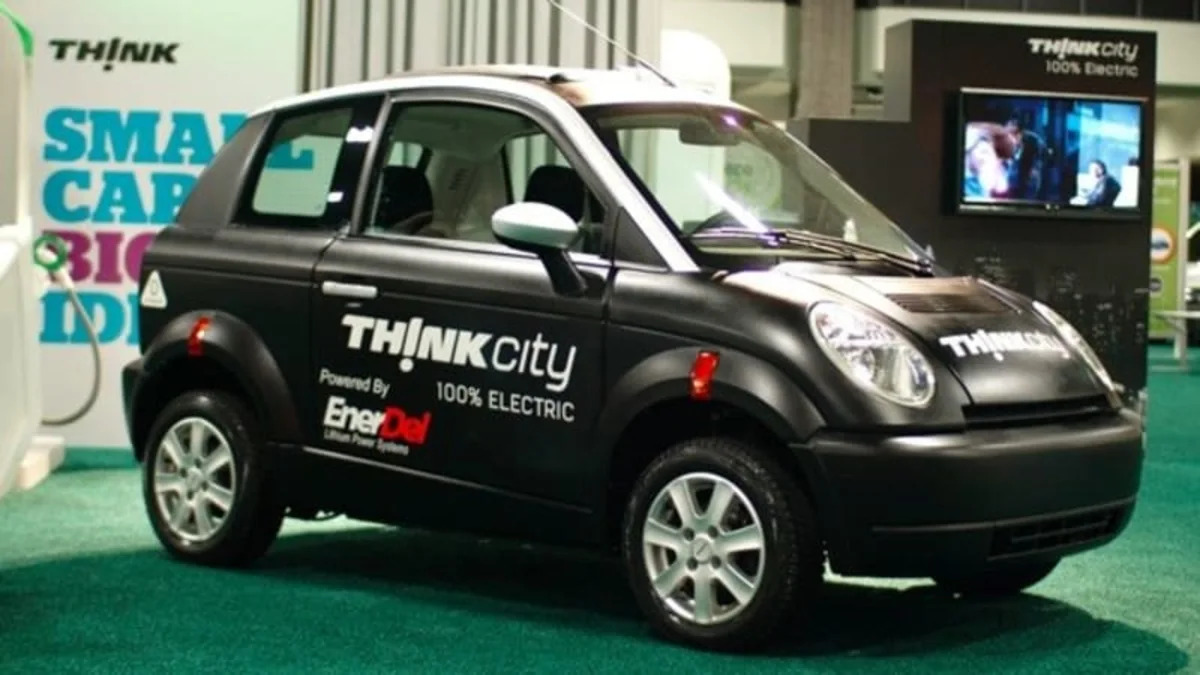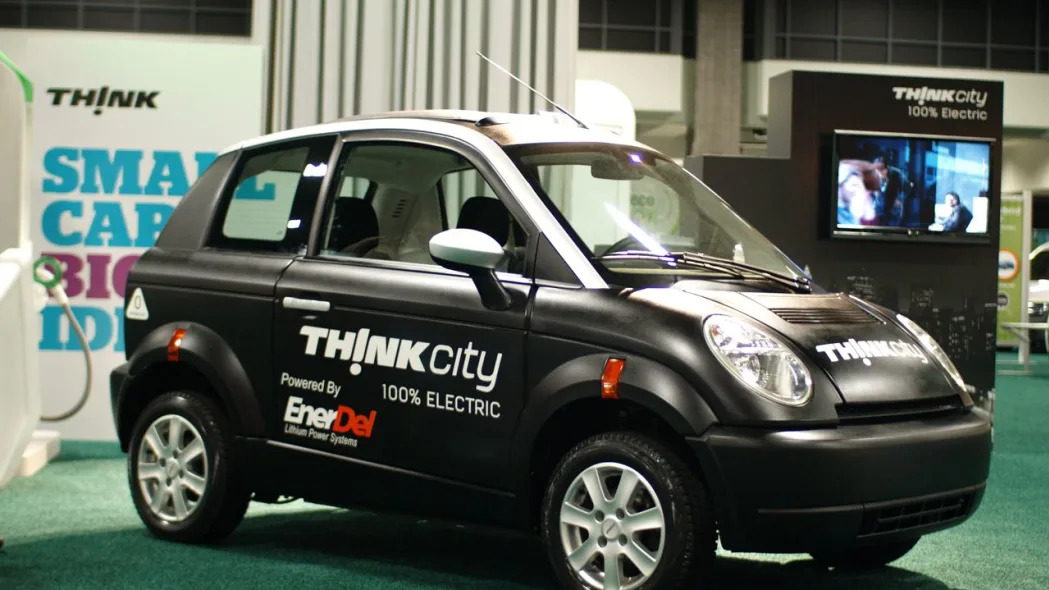Think City EV – Click above for high-res image gallery
Detroit News columnist Neil Winton apparently feels the need to repeat his criticism of electric vehicles (EVs). Last year, he wrote a column called "Electric cars attract hype, but reality is less exciting." Last week, he returned to the theme with his piece "Battery-only cars make no sense, but still find investors" in which he concludes that EVs are "inferior in every way." Winton's main issues with EVs are that they are too expensive and don't offer the range that drivers need. Even though Winton is based in the UK, he's certainly blinded by General Motors marketing speak, as his lede makes obvious:
Um, despite The General's best efforts to tell us otherwise, the difference between a PHEV and an EREV is a semantic one. But whatever. Curmudgeons come and curmudgeons go – and there are some legitimate criticisms that can be levied against EVs – but all-electric automaker Think was not about to let Winton get the last word.It's a bit like those old Looney Tunes cartoons, when the Road Runner races off a cliff and it takes a little while for gravity to establish its case for the inevitable swift vertical descent. How else can you explain the fact that investors still take battery cars seriously, after the invention of the plug-in hybrid, not to mention the extended range electric vehicle (EREV)?
Think CEO Richard Canny wrote a letter to the Detroit News refuting some of Winton's points, ending with:
In fact, even after the battery in an EV has completed its 10-year useful life, it'll still retain about 60% of its energy density. Owners of EVs will have a valuable asset that could provide energy storage for offices buildings. A market will develop to pay them for these assets, further reducing overall cost of EV ownership. The electric car is starting to look like a stronger proposition now, isn't it?
*UPDATE: Canny sent AutoblogGreen an email noting that his response was edited by the Detroit News to under 300 words. His full response is pasted after the break.
[Source: Detroit News, Think]
RESPONSE FROM RICHARD CANNY
THE CASE FOR ELECTRIC VEHICLES IS CLEAR
The case for battery-powered electric vehicles is perfectly clear. It only takes a little foresight-something entirely missing from Neil Winton's column ("Battery-only cars make no sense," Detroit News, February 10).
In the near future, EVs will indeed provide an important part of a comprehensive mobility portfolio helping to address national energy security and global environmental concerns. Yes, technologies to improve the fuel efficiency of gas- and diesel-powered vehicles, hybrid-electrics and alternative fuels like cellulosic ethanol will each play important roles in meeting customer needs while reducing oil dependency and greenhouse gases. So too will EVs, with the additional benefit of producing no tailpipe emissions at all.
Each of Winton's arguments against EVs breaks down upon knowledgeable scrutiny:
• Batteries are too expensive, he says, at least until economies of scale and technological advancements in the battery industry bring anticipated cost reductions. (Remember how expensive DVD players were when they first came out? Have you priced one lately? And didn't Bill Gates once suggest that 640K ought to be enough memory for anyone?) EV battery costs are expected to fall by at least 50 percent in the next three years through a combination of battery design advancements and manufacturing efficiencies, along with improvements in the energy efficiency of EVs that will lead to a down-sizing of the battery pack.
• But the battery packs required for HEVs today are much smaller and therefore less expensive than the packs required to power an EV, Winton says. True, but EVs have an obvious efficiency over HEVs that won't go away as technology advances-they need only an electric motor as opposed to the electric motor-internal combustion engine combo in an HEV. The added weight, complexity and expense of a redundant propulsion system gets harder to justify as battery prices fall, especially in smaller urban commuting vehicles. Not to mention the maintenance requirements and oil changes for combustion engine vehicles and hybrids. EVs have far fewer moving parts and no regular routine maintenance requirements at expensive dealerships.
• Won't range anxiety among potential customers doom the EV as a mainstream vehicle choice? No. A THINK City electric car, being sold in Europe right now and coming to the U.S. later this year, has a range of more than 100 miles per charge. That's well within the daily commute plus lunch-time errand use of millions of potential American customers. They can easily recharge their cars overnight using household current-at a cost that will amount to as little as 2 cents a mile.
• For those still nervous about getting stranded, an infrastructure of quick charge stations will emerge, beginning in the cities where corporate and municipal fleets first embrace EVs. Winton contends that the technology behind quick charging is questionable. But THINK and AeroVironment last month announced at the Washington Auto Show that ultra-fast charging-zero charge to 80 percent charged in just 15 minutes-will soon be here. In fact, THINK and its battery supplier, Indianapolis-based EnerDel have been fast-charging a THINK City daily for months now. THINK City and its advanced lithium ion battery have been specifically designed for the rigors of ultra-fast charging. We'd be pleased to demonstrate it to Mr. Winton or another writer from the Detroit News. We'll just need 15 minutes of your time.
• The electric grid is hopelessly inefficient, Winton contends. Yes, it is inefficient. But not hopelessly, and the sensible deployment of smart EVs like the 3-G connected THINK City can make it stronger. It is, in fact, the emergence of hundreds of thousands, and then millions, of EVs that will help provide the load management and energy storage that is missing today, bridging the gap between expensive periods of peak demand and relatively inexpensive off-peak times. The owner of an EV will have an energy-storage device that will interact with the energy grid as a money-making proposition, offsetting some of the owner's energy costs while helping to reduce energy disruptions from a periodically over-taxed grid. A growing network of plug-in EVs will complement the increasing proportion of renewable but volatile wind and solar energy coming into the grid. When's the last time your car earned money for you sitting in your garage? Or provided back-up power after a storm?
• In fact, even after the battery in an EV has completed its useful life of eight to ten years, it will still retain about 60 percent of its energy density. It will be a useful asset contributing to energy storage needs in offices and municipal buildings, utilities, etc. where the relative weight and size inefficiencies (compared with a new battery) will not be important. Again, the owners of EVs will have a valuable asset, and a market will develop to pay them for these assets, further reducing their overall cost of ownership. The battery electric car is starting to look like a stronger proposition now, isn't it?
Winton also contends that the case for man-made global warming is weak. Space limitations prevent me from taking that one on. But let me just say that even if one denies the science demonstrating the destructive qualities of man-made carbon dioxide in the upper atmosphere, he'd have to admit that a technology that helps reduce dependence on imported oil while contributing absolutely no tailpipe emissions ought to be given strong consideration in an improved portfolio of personal transportation choices.
Richard Canny,
CEO, THINK



Sign in to post
Please sign in to leave a comment.
Continue